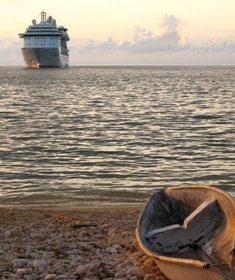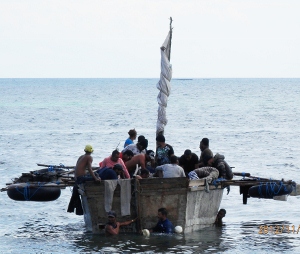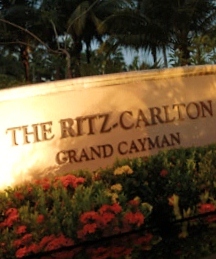Archive for November 7th, 2012

Port to go out for tender
 (CNS): In the wake of the premier’s U-turn yesterday following significant pressure from the UK, McKeeva Bush confirmed Wednesday that documents were now being drawn up to enable the cruise berthing project in George Town to go out for full tender. Although the Port Authority had previously put out a request for ’expressions of interest’, a formal request for proposals has never been undertaken. Following a repeat of Tuesday evening’s sudden announcement by Bush that he was abandoning the current talks with China Harbour Engineering Company over the project, the Beijing firm expressed its disappointment by the turn of events and pointed to the expense it has occurred under its formal agreement.
(CNS): In the wake of the premier’s U-turn yesterday following significant pressure from the UK, McKeeva Bush confirmed Wednesday that documents were now being drawn up to enable the cruise berthing project in George Town to go out for full tender. Although the Port Authority had previously put out a request for ’expressions of interest’, a formal request for proposals has never been undertaken. Following a repeat of Tuesday evening’s sudden announcement by Bush that he was abandoning the current talks with China Harbour Engineering Company over the project, the Beijing firm expressed its disappointment by the turn of events and pointed to the expense it has occurred under its formal agreement.
In the Legislative Assembly on Wednesday morning, the premier confirmed that government was now preparing to engage in an open and competitive tender after the abandonment of the talks with CHEC.
He said that the project manager, Alastair Patterson, accountants at KPMG and lawyers from Maples and Calder were now working on the documents and that the request would be done as soon as possible. Bush said that he would not be involved in this part but his major concern was to ensure value for money. He said he still hoped to get the project started, which should create the hundreds of jobs it would have done had he been allowed to carry on with the CHEC talks.
After Bush announced that he would finally address the UK’s concerns regarding the port project and abandon the talks with CHEC in favour of an open competitive process, as well as implement the Fiscal Framework for Responsibility, an FCO spokesperson said that Mark Simmonds, the UK’s overseas territories minister, welcomed the premier’s statement “with regard to the proper procurement and competitive tendering of the cruise ship port development, as well as his commitment to implement the FFR, as signed, into Cayman Islands Law.”
Bush claimed his U-turn, following his defiant stance since the publication of a letter from Simmonds last Friday, was made with a heavy heart. He said his government had been stymied unless they followed the FCO's "prescribed approach to the letter”.
“I must therefore regretfully say that the government is left with no choice but to abandon the present contract negotiations, which were on the verge of being completed.”
CNS understands that Bush was placed under significant pressure during a long distance call with Simmonds in London onTuesday. Although the UK has not been specific about what it would do if Bush failed to follow the correct process concerning the port, the governor was called to London unexpectedly for an unscheduled meeting with the UK minister, source close to the FCO told CNS.
Whether this was to examine the “alternatives” that Simmonds said he was considering is not clear, but Bush’s long awaited capitulation over both the port and the FFR may have saved Cayman from the brink of much greater direct British interference in the territory’s affairs.
Meanwhile, following news that government was stopping the talks with CHEC and moving to a competitive bid, the Beijing-based company said that while it understood the UK’s authority, it felt that the history of its involvement and cost had not been fully considered.
Regional Director of China Harbour Engineering, Zhongdong Tang, said the negotiations between government and CHEC resulted in a Framework Agreement (FA) and CHEC has spent a vast sum of money associated with the port project.
“CHEC also incurred significant expenses developing a detailed design for marine and other upgrade works at Spotts Dock,” Tang said, adding that a considerable amount of proprietary and commercial data had been produced by CHEC and it should not be subjected to the possibility of any other entity being able to use its data for the development of the port project.
“CHEC is, therefore, requesting that the Cayman Islands Government takes all such steps as may be required to prevent the use of the data by any person, entity or official without CHEC’s consent,” Zang stated, falling short of threatening legal action against the Cayman government.
However, pointing to its “continuing legal relationship” with the government under the FA, CHEC said the most equitable way to move forward was for discussions to be held with government, CHEC and all relevant authorities who share concerns to remove any doubt that CHEC’s proposal would deliver value for money.
See full statement from CHEC below.
Vote in the CNS poll: Should-Mckeeva-Bush-resign-now?

Cubans travel on after passing by East End
 (CNS): A group of Cuban men and women on route to Swan Island located some 90 miles off the coast of Honduras passed by East End this morning but did not land or request any assistance. The fiberglass 28-30 foot vessel powered by two diesel engines which also had a mast with a canvas sail was considered sea worthy by local officials who allowed the vessel to carry on its journey. Immigration intercepted the boat which was carrying 25 migrants near the shore in Gun Bay, East End, at about 6:40am Wednesday 7 November.
(CNS): A group of Cuban men and women on route to Swan Island located some 90 miles off the coast of Honduras passed by East End this morning but did not land or request any assistance. The fiberglass 28-30 foot vessel powered by two diesel engines which also had a mast with a canvas sail was considered sea worthy by local officials who allowed the vessel to carry on its journey. Immigration intercepted the boat which was carrying 25 migrants near the shore in Gun Bay, East End, at about 6:40am Wednesday 7 November.
Officials confirm there were 22 men and three women aboard who all expressed an intention to continue their journey to Swan Island.
Immigration Enforcement Officers at the scene were assisted by the Police Marine Unit and other RCIPS district officers and, in accordance with local policy, deemed the vessel seaworthy and confirmed the well-being of its passengers the Cubans were allowed to continue on their journey. Cayman officials monitored the migrants until they departed at about 12:10pm, on their own power and under Marine Unit escort.

Mac blew last chance to recover $6M duty debt
 (CNS Business): After RC Cayman Holdings LLC acquired the debt that financed much of the Ritz Carlton- Grand Cayman development, the company reached out to the Premier’s Office with a range of proposals concerning the resort, including the $6M owed by the previous owers, but they never received a reply, according to a press release issued today. This means the government has missed the final opportunity to recover any of the debt owed to the people of the Cayman Islands for the deferred duty concessions given to the developer at the time the property was built. RC Cayman secured ownership of the resort on 31 October as the successful bidder in their own public auction for the property and say they will pay all stamp duty owed on that sale without concessions. Read more on CNS Business
(CNS Business): After RC Cayman Holdings LLC acquired the debt that financed much of the Ritz Carlton- Grand Cayman development, the company reached out to the Premier’s Office with a range of proposals concerning the resort, including the $6M owed by the previous owers, but they never received a reply, according to a press release issued today. This means the government has missed the final opportunity to recover any of the debt owed to the people of the Cayman Islands for the deferred duty concessions given to the developer at the time the property was built. RC Cayman secured ownership of the resort on 31 October as the successful bidder in their own public auction for the property and say they will pay all stamp duty owed on that sale without concessions. Read more on CNS Business

Obama victory confirms old headaches for offshore
 (CNS Business): President Barack Obama’s decisive win in the US Presidential elections yesterday ensures a continuation of the aggressive stance towards low- or no-tax jurisdictions that has been a marked strategy of his first administration. An early issue in the campaign and the subject of several attack ads had been Romney’s personal use of offshore accounts in jurisdictions such as the Cayman Islands and Bermuda, and the relatively low tax he pays as a result. Had he won, US policy towards offshore might have taken a new direction. “Obama's demagoguery is not good for Cayman's financial industry. It augments the image built up by popular culture that places such as Cayman and Switzerland somehow are rogue regimes,” Dan Mitchell of the Cato Institute told CNS Business earlier this year. Read more and comment on CNS Business
(CNS Business): President Barack Obama’s decisive win in the US Presidential elections yesterday ensures a continuation of the aggressive stance towards low- or no-tax jurisdictions that has been a marked strategy of his first administration. An early issue in the campaign and the subject of several attack ads had been Romney’s personal use of offshore accounts in jurisdictions such as the Cayman Islands and Bermuda, and the relatively low tax he pays as a result. Had he won, US policy towards offshore might have taken a new direction. “Obama's demagoguery is not good for Cayman's financial industry. It augments the image built up by popular culture that places such as Cayman and Switzerland somehow are rogue regimes,” Dan Mitchell of the Cato Institute told CNS Business earlier this year. Read more and comment on CNS Business
ToR published for BT dump
(CNS): The Terms of Reference (ToR) for an environmental impact assessment on the proposed new landfill in the wetlands in Bodden Town, part of government's deal with Dart, have been published and the public has just three weeks to submit their comments. The parameters of the ToR had already been limited before the consultation began, as, disregarding advice from the environmental impact assessment board, the review will not include alternative sites. However, the EIA will consider the alternative of ‘no action’ and maintaining the landfill in George Town. The ToRs indicate that the developer will only be responsible for the first phase of the site, which is confined to a lined landfill and associated facilities.
Should government go ahead with its decision to partner with the Dart Group in the proposed controversial private-public partnership involving a number of projects, crown land swaps and the relocation of the landfill to Bodden Town, Dart has stated that it will finance the first phase of a waste-management facility on a site large enough for government to introduce re-cycling, re-use and other management possibilities.
However, the developer will only be responsible for constructing a lined landfill and then capping and remediating the existing George Town dump. The future of waste-management would remain in the hands of the DoEH unless government opts for another tendering process for a private sector firm to manage the new landfill and develop the additional facilities that will be required.
The proposal has created considerable opposition for a wide number of reasons and while it is broadly accepted that government must address the landfill issue in George Town, most experts note that moving a dump should only be an absolute last resort as no matter how sophisticated, all landfills pose a significant threat to the environment.
At present, the proposal to move the landfill forms part of a wider deal between government and the Dart Group, which will be subject to the fiscal agreement the government has signed with the UK and is expected to be passed into law during the current meeting of the Legislative Assembly. Given the recent developments and the pressure from the UK about international best practice and value for money when it comes to procurement, it is not clear if this deal with the islands’ largest investor will pass muster with the Framework for Fiscal Responsibility.
While the UK was extremely vocal in its opposition to government progressing talks with China Harbour Engineering Company on the development of the cruise port facilities, which has resulted in the abandonment of those talks by the premier, the FCO has said little so far about the ForCayman Investment Alliance. This is a much wider and more complex proposal, linked to further private sector development, the closure of the West Bay Road and the swapping of crown land including the current George Town dump in exchange for Dart land for the new facility in Bodden Town.
Given the location of Dart’s proposed new landfill, close to wetlands, the EIA will take into consideration two major conventions to which Cayman is a signature and has international legal obligations. The ToR will consider the Convention on Wetlands of International Importance and the Convention on Biological Diversity because, having signed them, the CIG is committed to maintaining the ecological character of the Wetlands of International Importance and to plan for the wise use, or sustainable use, of all of the wetlands in the country.
The EIA will examine the potential effects of the proposed project on the existing socioeconomic conditions in terms of population dynamics, infrastructure, economic and business status, tourism and recreation. It will look at the impact on the quality of groundwater, surface water, sediments and the subsurface soils, both of the property on which the WMF will be located and the surrounding area. The local climate, including wind direction and speed, daily rainfall and temperatures as well as potential evapotranspiration and atmospheric humidity, will also be part of the EIA.
Transport and traffic is a major issue for many objecting to the site because moving the dump to Bodden Town will increase traffic to the district as the vast majority — an estimated 80% — of Grand Cayman’s rubbish is generated in West Bay and George Town, which would need to be transported to the new site. The EIA will examine what that means for the community and will also look at the visual impact as well as noise, vibration and air quality. The likely impacts of the proposed WMF on the ecological environment of the site and its surroundings will also be a major part of the assessment.
The public can begin submitting their comments on the draft terms of reference immediately but two public meetings will be held in Bodden Town and George Town a week before the consultation period closes, where members of the EIA team and Dart will be available to answer questions about the proposed ToRs for the project.
The first meeting will be held on Tuesday, 20 November, at the Bodden Town Civic Centre and presentations will begin at 7pm, but the public will be able to go examine the proposals from 12 noon. The second meeting will be in George Town at the Public Library on the following evening Wednesday, November 21, when again the public will be able to see the ToRs from 12pm. The comment period will officially close on November 29.
See draft Terms of Reference here.
See details of consultation, as well as where and how to submit comments here.

Environmental Charter has force of law
Following the historic day on which the Bill of Rights became effective, it is worth reminding the country, and our legislators in particular, that the protection of the environment provided for in paragraph 18 of the Bill is already meant to be safeguarded by the commitments made by the government in the name of the people of these Islands in the Environmental Charter – Cayman Islands, signed by McKeeva Bush on 26 September 2001.
Lest Mr Bush, or anyone else, presume that the Charter is merely a list of nice intentions which can be conveniently ignored, the findings of the Bermuda Ombudsman in her report, Today's Choices – Tomorrow's Costs, Systemic Investigation into the Process and Scope of Analysis for Special Development Orders, February 2012 and the follow-up Special Report of 1 June 2012 (both available at www.ombudsman.bm) should leave no one in any doubt that the Cayman Islands Environmental Charter has the force of law.
Along with a number of other Overseas Territories, the Cayman Islands and Bermuda each entered into its own Environmental Charter with the UK in 2001. The charters are identical except for minor punctuation. The Bermuda Ombudsman's role is similar to that of our Complaints Commissioner. Like the Complaints Commissioner, the Ombudsman is authorised to launch investigations on her own motion in the public interest.
In her report into the conduct of the approval process for the Tucker Bay Development the Bermuda Ombudsman concluded that Bermuda is obliged to conduct Environmental Impact Assessments prior to approval in principle for development proposals that are major or likely to have adverseeffect on the environment.
She says: "This obligation is established by Bermuda's signature in 2001 to the UK Environmental Charter" and further, that the obligations arising out of the Charter are not discretionary. "The UK Charter is more than just a statement of good intentions. There is no enforcement mechanism, however, like the Tax Information Exchange Agreements [of] recent years, our signature on the UK Environmental Charter has the force of law. Our word must be our bond."
The Ombudsman did not reach this conclusion lightly but only after having examined the relevant principles of international law, common law laid down by the Privy Council and the UK courts that, though not binding, is persuasive in the Cayman Islands as it is in Bermuda, international best practices and standards for public consultation and data gathering and analysis and having consulted widely within and without Bermuda.
As a matter of law, international agreements are legally binding when they are (i) signed in writing, with specific commitments; (ii) entered into without coercion or duress; and (iii) there is no express written provision that the signatories do not intend to be bound. The agreement need not include enforcement mechanisms for non-compliance. As the Ombudsman said, "In such cases, the primary sanction for non-compliance is the risk to the reputations of signatory governments."
A reading of the detailed reports leads to the inevitable conclusion that the Ombudsman's statement that “Our signature [of the Charter] created a legitimate expectation that environmental impact assessments (“EIAs”) would be conducted prior to approval of certain developments” applies equally in the Cayman Islands, and in fact in respect of the entire Charter.
Mr Bush's signature on the Charter created a legitimate expectation that all commitments will be carried out. Of special concern are the Charter commitments couched in mandatory terms. These are:
The government of the Cayman Islands will:
Commitment 2 – Ensure the protection and restoration of key habitats, species and landscape features through legislation and appropriate management structures and mechanisms, including a protected areas policy, and attempt the control and eradication of invasive species.
Commitment 3 – Ensure that environmental considerations are integrated within social and economic planning processes, promote sustainable patterns of production and consumption within the Territory.
Commitment 4 – Ensure that EIAs are undertaken before approving major projects while developing our growth management strategy.
Commitment 5 – Commit to open and consultative decision-making on developments and plans which may affect the environment; ensure that EIAs include consultation with stakeholders.
Commitment 8 – Ensure that legislation and policies reflect the principle that the polluter should pay for prevention or remedies; establish effective monitoring and enforcement mechanisms.
Commitment 11 – Abide by the principles set out in the Rio Declaration of Environment and Development and work towards meeting International Development Targets on the environment. The principles of the Rio Declaration require that: (a) development and environmental protection must constitute an integral part of the development process, public consultation and access to information held by public authorities concerning the environment must be available; (b) prior to approval, and EIA shall be undertaken to provide the scientific evidence necessary for the determination, under the Precautionary Principle to do no harm, of whether proposals threaten serious or irreversible damage to the environment.
A review of the recent news headlines in the last month alone shows how abjectly the government has failed in this regard. For example:
Commitment 2. Minister Scotland has still not brought any form of the Conservation Bill (more than 10 years in the making) to the Legislative Assembly. Yesterday the Animals Law was amended to remove the only animal sanctuary designated within it for Cayman Brac. Even where restoration of habitat has taken place, it is taking further legal action to prevent its destruction for a second time in South Sound.
Commitments 3, 4, 5 and 11. The Eagle Assets Investments Ltd. Frank Sound development, by DoE calculations, represents cumulative applications of 535 acres of land. The Duck Pond proposals from Caymarl Ltd represent 416 acres of land. Together these amount to more than 2% of the entire Cayman Islands. No EIA’s are available. There are apparently no plans to conduct an EIA for the Shetty Hospital. Primary shrubland and forest on land owned by Mr Imparato in the vicinity of the hospital site has been razed to the ground with no apparent authority.
Preparatory work has begun at the proposed Dart landfill site in Bodden Town ahead of an EIA. Terms of reference were made public on the DoE website only on Monday.
If the people of the Cayman Islands are to have confidence that any approvals given for these projects are made by a "government [that] shall, in all its decisions, have due regard to the need to foster and protect an environment that is not harmful to the health or well-being of present and future generations, while promoting justifiable economic and social development", as the Bill of Rights mandates, then it must ensure that appropriate legislation is passed, environmental impact assessments (EIA) are undertaken before approval is given and the public must have reasonable time for consultation.
Government must also train its staff in its obligations under all the laws of the Islands. It is no answer, as offered in the Eagle case, that the planning regulations do not permit the CPA to require a Planned Area Development application and EIA when it is abundantly clear that the proposed development, being drip fed in stages, is of a magnitude that requires such actions. The Charter mandates that you do it.